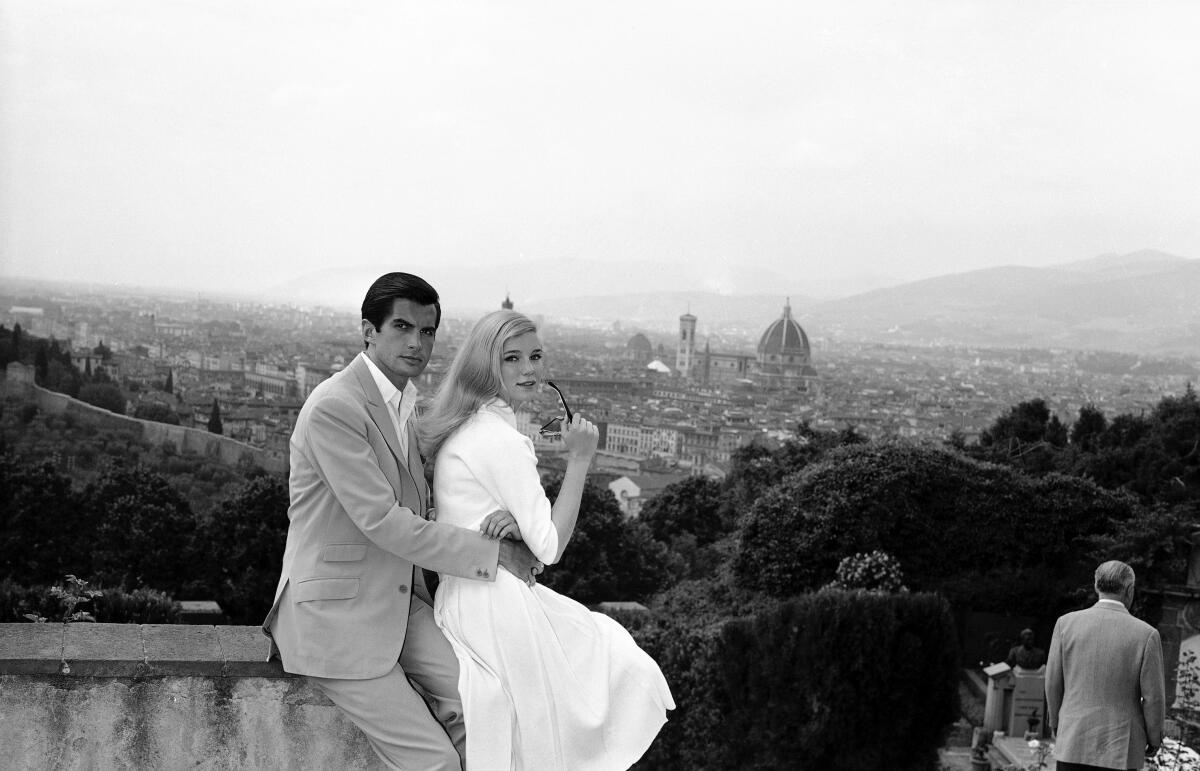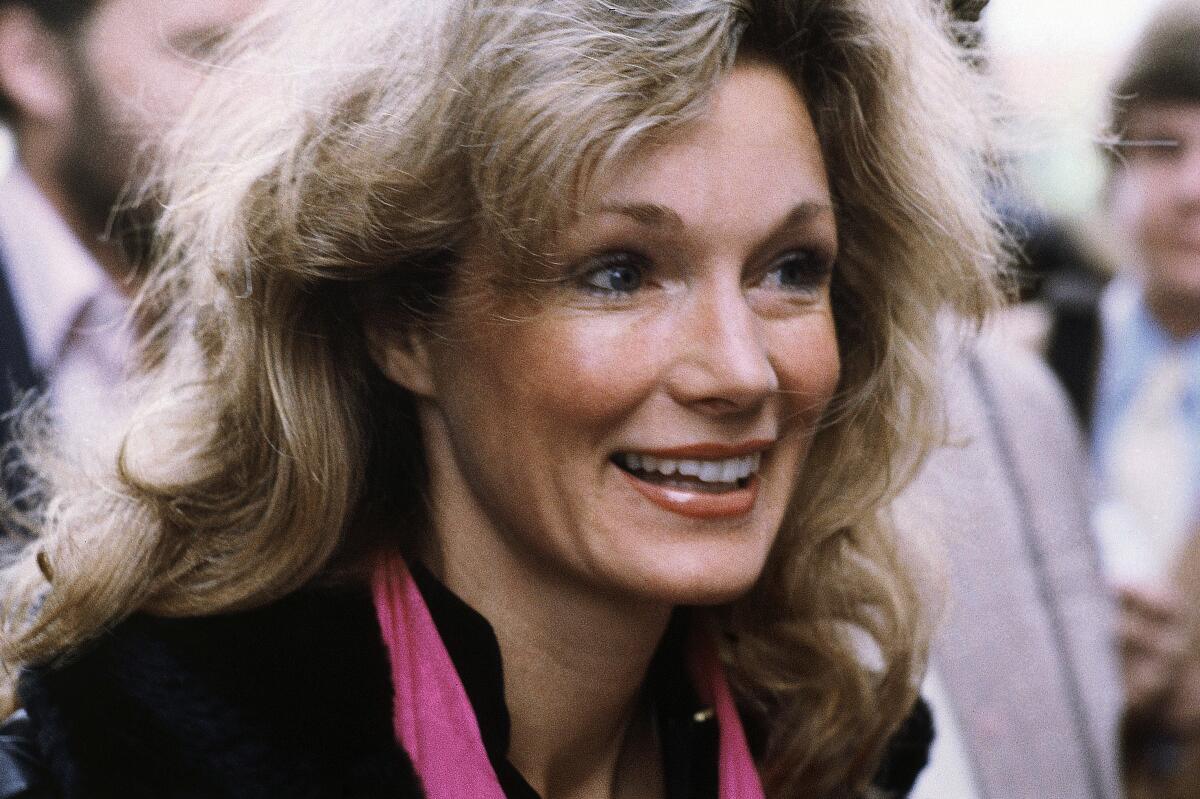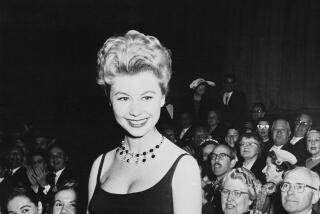Yvette Mimieux, who rose to fame in ‘The Time Machine’ and ‘Where the Boys Are,’ dies

- Share via
Yvette Mimieux, the blond and blue-eyed 1960s film star of “Where the Boys Are,” “The Time Machine” and “Light in the Piazza,” has died at her home in Los Angeles.
Michelle Bega, a family spokeswoman, said Mimieux died in her sleep of natural causes overnight Monday evening. Mimieux was 80.
In 1960’s “The Time Machine,” based on H.G. Wells’ 1895 novel, Mimieux starred opposite Rod Taylor as Weena, a member of the peaceful, blond-haired Eloi people in the year 800,000, who don’t realize they’re being bred as food by the underground Morlocks.
That role and others that soon followed made Mimieux one of the ‘60s most radiant starlets. The same year, she also starred in the MGM teen movie “Where the Boys Are” as one of four college students on spring break in Florida. Her character, distraught after being sexual assaulted in a motel, walks despondently into traffic.
“I suppose I had a soulful quality,” she told the Washington Post in 1979. “I was often cast as a wounded person, the ‘sensitive’ role.”
Yvette Carmen Mimieux was born Jan. 8, 1942, in Los Angeles to a French father and a Mexican mother. She wasdiscovered at 15 when publicist Jim Byron, as he told it, spotted her on a bridle path from a helicopter while flying over the Hollywood Hills. She and a friend were riding on horseback; Byron landed in front of them and gave her his card. Mimieux began as a model before MGM signed her in 1959.
“The subtle approach is the thing,” Byron said in 1961. “I think we’ve got another Garbo on our hands.”
And for a few years, Mimieux was ubiquitous. Life magazine put her on the cover with the headline: “Warmly Wistful Starlet.” She made eight films before turning 21.
Mimieux starred in four films in 1962, including Vincent Minnelli’s “The Four Horsemen of the Apocalypse” and Guy Green’s “Light in the Piazza.” In the latter, she played the beautiful, special needs daughter of Olivia de Havilland. On a trip to Italy, Mimieux’s character Clara is pursued by a young Italian in Florence, played by George Hamilton.
Olivia de Havilland was the last living principal actor from the 1939 epic film ‘Gone With the Wind’ and a two-time Academy Award winner.
Mimieux played a bride in “Toys in the Attic” (1963), an epileptic surfer in “Dr. Kildare” (1964) and a bride in “Joy in the Morning” (1965). She was nominated for a Golden Globe three times, including for her role in the short-lived ABC series “The Most Deadly Game,” from Aaron Spelling. In the ‘70s and ’80s, she increasingly appeared in TV movies, some of which she helped write.
Mimieux co-wrote and co-produced the 1984 CBS TV movie “Obsessive Love,” about a deranged fan obsessed with a soap opera star. Mimieux said she had to battle the network over having a woman, played by herself, in such a role. Her idea stemmed from John Hinckley’s obsession with Jodie Foster, only with the gender roles reversed.
“The network felt people wouldn’t believe me as this woman. They said to me, ‘She’s a loner, and she shouldn’t be attractive,’” Mimieux told the New York Times in 1984. “I asked them, ‘Are you saying that only unattractive people can be crazy or lonely or have unfulfilled lives?’″
Mimieux said television was never the “love affair” she had with film. But she complained about the kinds of movie roles she was offered, saying they were typically one dimensional or stereotypical. (One of her last notable movies was the 1979 Disney film “The Black Hole.”) So Mimieux retired from show business in her late 40s.

“I decided I didn’t want to have a totally public life,” she said. “When the fan magazines started wanting to take pictures of me making sandwiches for my husband, I said no.
“You know, there are tribes in Africa who believe that a camera steals a little part of your soul, and in a way I think that’s true about living your private life in public. It takes something away from your relationships, it cheapens them.”
Mimieux first married Evan Harland Engber in 1959 before later divorcing. She was married to film director Stanley Donen from 1972 to 1985. In 1986, she married real estate mogul Howard F. Ruby, who survives her.
More to Read
Start your day right
Sign up for Essential California for the L.A. Times biggest news, features and recommendations in your inbox six days a week.
You may occasionally receive promotional content from the Los Angeles Times.






